Let’s take a break from this Daggerfall mess. Here’s a Halloween special! It’s a day early for ye olde posting schedule, so don’t expect to see anything Wednesday. Halloween is the time, in the northern hemisphere at least, where we feel the presence of the dead close to us. So what better than an album about death and rebirth? Nothing, that’s what! Let’s talk about Jethro Tull’s A Passion Play.
This album is super-important to me, personally. My band director in high school got me into Jethro Tull, and they remain one of my favorite bands ever. He specially recommended this album, as I was “cynical.” I never thought I was. Who knows? I do know that it fucking works for me, to this day.
Tull is most famous, probably, for Aqualung. At least the song “Aqualung” gets played the most on the radio. Tull is well known, among fans at least, for changing things up every few albums. They started out as a blues band, did heavy rock, prog rock, and even some albums inspired by Indian flute playing.
My favorite Tull story is that Ian Anderson’s daughter was gently convinced to play flute in school, since Anderson had plenty of spares and could avoid buying a new instrument. When she was practicing, he tried to correct her finger positions. She told him he was wrong and showed him in the book. She was right. He’d been playing flute wrong for like twenty years. So he proceeded, on tour, to get a beginner’s book and relearn the fingerings, in his hotel room at night.
Fucking. What.
On a technical level, Anderson’s guitar playing is also interesting for similar reasons, though it’s not as weird or rare as all that. He picks a string and finger that he deems “central” in a song — that is, he’ll probably have that finger on that string all the time. Then he rotates his other fingers around it, altering fingerings for each song.
~
Why did I tell you all that? I guess it shows I can still nerd the fuck out when it comes to certain things.
~
OK. A Passion Play is the follow-up to the fairly famous Thick as a Brick. It’s another huge concept album. In fact, my CD from high school didn’t have track divisions. Which was stupid, it was a CD, fucking do it. But oh well. Happily, the streaming service I use does in fact have songs, so we can do this.
The basic narrative of A Passion Play is that a businessman dies, unmourned and forgotten. He goes to heaven, where the angels show him film reels of his own life. He then volunteers to go to Hell, after being told he doesn’t have to. In death we see our lives objectively, it seems. He meets Satan, gets fed up with Hell, and forces his way out — which handily mirrors Christ’s harrowing of Hell and gets him in line to reincarnate.
~
I’ll be using Tina Gong’s Golden Thread Tarot, mostly because I just got it as an anniversary present. It’s pretty incredible. Go check it out.
So let’s link to the songs, in case you’re not familiar with the album.
Best Friends
In which our hero, uh, dies. The album comes out swinging, mocking our protagonist for his lifestyle and his hot-handed use of the telephone (presumably to make business deals). The torn umbrella is a great image, as it demonstrates the character is trying to protect himself and failing — it fails to keep out rain and sun alike.
9 of Pentacles
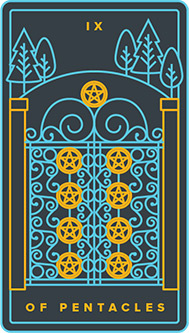
Nines are about completion in the suit. Nine months to give birth and all that (I know it’s technically ten, yes). In the suit of the Pentacles we think of money and earthly delights. Our character is certainly rich and the song is sensual, with a sneering sound that catches our attention immediately. This song focuses on the material circumstances of this man’s life, even as it gets figurative with the umbrella. Even then, the image is specifically physical. He’s avoided the sun in that he avoids anything spiritual or human or beautiful.
Lifebeats
This instrumental track starts mysterious and slightly confusing. Then it gets upbeat, with an old-fashioned kind of sound in the background, a horn of some kind. Then it shifts into the flute bit and lands, ultimately, in the whistling of someone doing their job without thinking of much. I’ve always assumed those whistlers are the “angels” who meet the dead man. So this song is the death of the character. It happens with no words, only sounds, and falls into silence before the next song begins.
3 of Pentacles
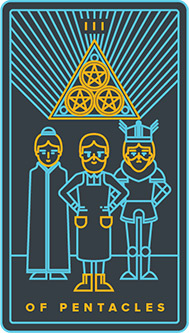
More pentacles! The man loses his life! This card usually depicts a man working in a church, sculpting some of the pillars. Here we see the priest and the workers posing together with the sculpture above them. The creator’s app (there’s no book with the deck, but the free app can actually be used without the cards, so go get that at least) says this card highlights people working together. The first thing I think of there is the people in Heaven working to welcome the newly deceased. They certainly become important later, and they’re building something of spiritual significance.
The Silver Cord
Here is the man’s understanding of his death. The song describes his funeral, with his friends getting there late and leaving in a rush. The play is hushed, as the character himself passes into a new act. The cord is the link connecting body and spirit.
King of Swords
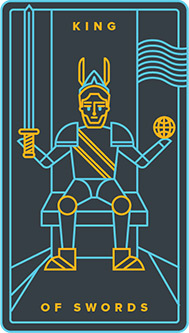
The kings are usually about mastery of their suit element, like the queens. Unlike the queens, the kings focus on external manifestation, using their power to effect change in the world (the queens typically indicate an inward-turning mastery, over the self. Dude, look, the tarot is old, it’s got some gender binary stuff happening.). Swords are about the intellect. I suppose I would say this card shows us the song is the first moment the dead man sees his life for what it is. That’s really going to happen later, in excruciating detail (for him, I mean). But here he realizes that he’s gone. He asks if anyone can see him, and says he’s dead. He knows this, for the first time. The cord is cut, as well, so the sword indicates the severing of his “self” from his body.
A Reassuring Tune
This soft instrumental, which I had trouble finding on its own, carries a few harsh bars that are more like rock music. The passage into the afterlife is probably not as cataclysmic as the passage from life into death.
Hierophant
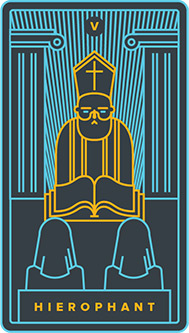
I couldn’t make it up if I tried. The Hierophant, as the resident priest in the tarot, governs the traditions and rites of the people. He’s the day-to-day boss of the spiritual organization, as opposed to the deep well spring of its inspiration and spiritual power (that would be the High Priestess). So the Pope (as he’s more traditionally known) would be who we’d go to for death rites. The quick and easy passage into Heaven, right here, right now. Away we go!
Memory Bank
We finally meet the staff in Heaven. I’ve been talking about them long enough. This song is funny and arch and punny, too. It is the very picture of the public servant who has done this a thousand times, and will do it another thousand times. She doesn’t hate her job, but she doesn’t always remember that this is newer for you than for her. I mean, “the ice cream lady wet her drawers / to see you in the play…” is pretty fucking harsh. His life is so ridiculous it’s got everyone laughing at him. Note, too, the reference to their tips — they get the remainder from his life. The snotty tone tells us there’s not really anything there. So they don’t get paid here, or don’t get their tips at least. The instrumental portion bounces us and the dead man into the theater and into seats. Imagine some Fantasia-styled scene where ethereal cinema employees hustle a ghost into an empty theater, and you’ll find this music is the soundtrack for it, right enough.
10 of Swords
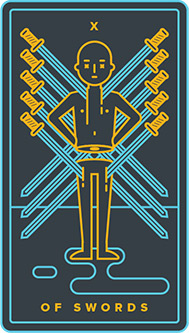
Harshness on top of harshness! The ten of swords is the one that usually depicts a dead man with ten swords sticking out of him. The fact that the man is standing here doesn’t mean he’s in any better condition. The return of the swords here show that he’s being shown something. He’s being slain by the facts, by the honest reactions of people to what he made of his life. This card’s a bad dude; it’s honest and a little mean, frankly. Just like our narrator. Can you imagine getting the chance to watch your entire life and hearing, beforehand, that people have been laughing? That’s what we’re all afraid of, isn’t it? But the dead man got himself into this mess, really.
~
In the next post, we’ll finish the album. We’ll be starting by what exactly is on that film reel.
Advertisements Share this:




